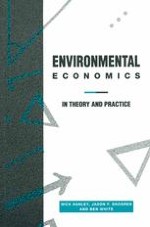1997 | OriginalPaper | Buchkapitel
The Economics of Sustainable Development
verfasst von : Nick Hanley, Jason F. Shogren, Ben White
Erschienen in: Environmental Economics in Theory and Practice
Verlag: Macmillan Education UK
Enthalten in: Professional Book Archive
Aktivieren Sie unsere intelligente Suche, um passende Fachinhalte oder Patente zu finden.
Wählen Sie Textabschnitte aus um mit Künstlicher Intelligenz passenden Patente zu finden. powered by
Markieren Sie Textabschnitte, um KI-gestützt weitere passende Inhalte zu finden. powered by
Within the field of environmental economics, it is now widely recognised that the goal of sustainable development is principally an equity, rather than an efficiency, issue (Howarth and Norgaard, 1993). This is not to say that economic efficiency is irrelevant to sustainable development, as reducing the quantity of natural resources used up per unit of human satisfaction will clearly help reduce demands on the environment. However, as will be shown, economic efficiency is not a sufficient condition for sustainable development. Thus removing government policies or market failures which encourage inefficient use of environmental resources may improve the prospects for sustainable development, but will not guarantee it. Achieving sustainable development (SD) involves achieving equity both within generations (intragenerational equity) and across generations (intergenera-tional equity). As Asheim puts it: 'Sustainable development is a requirement to our generation to manage the resource base such that the average quality of life we ensure ourselves can potentially be shared by all future generations' (Asheim, 1991).
